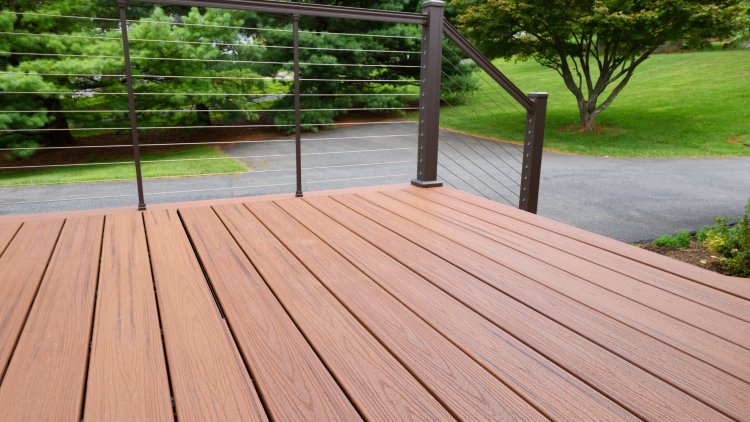Why Composite Decking Outlasts Traditional Wood: A Guide for Homeowners
This post explores the benefits of composite decking for homeowners. It compares composite decking to traditional wood, highlighting composite's superior durability, low maintenance, and lifespan. The post also mentions additional benefits like style options, slip resistance, and barefoot comfort. It concludes by recommending composite decking as a smart investment for a long-lasting outdoor space.

When considering the installation of decking, finding skilled professionals is paramount to ensuring a successful and durable outdoor space. Decking installers are experts who specialize in the assembly, construction, and finishing of decks, whether using traditional wood or composite materials.
Understanding the Enemy: Wood's Durability Challenges
The natural beauty of wood is undeniable. However, wood decks are susceptible to various elements that can significantly shorten their lifespan. Here are some key challenges wood faces:
- Moisture Damage: Wood is hygroscopic, meaning it absorbs and releases moisture with changes in humidity. This constant moisture fluctuation can lead to warping, cracking, and rotting. Even pressure-treated lumber, designed to resist moisture, eventually succumbs to these issues.
- Sun Damage: Prolonged exposure to sunlight degrades wood, causing it to fade, become brittle, and lose its structural integrity. Regular staining or painting can help mitigate this issue, but it adds to the maintenance burden.
- Insect Infestation: Wood is a smorgasbord for termites, carpenter ants, and other wood-boring insects. These pests can wreak havoc on your deck, compromising its structural integrity and requiring expensive repairs or even replacement.
- Fire Risk: Untreated wood is highly flammable, posing a safety hazard. While fire retardant treatments are available, they require periodic reapplication and may alter the wood's appearance.
The Durability Edge of Composite Decking
Composite decking is a manufactured material typically made from a combination of wood fibers, plastic polymers, and additives. This unique blend offers several advantages over traditional wood in terms of durability:
- Superior Weather Resistance: Composite decking is engineered to resist moisture absorption, minimizing warping, cracking, and rot. It also boasts superior resistance to UV rays, maintaining its color for much longer than wood.
- Low Maintenance: Unlike wood, composite decks require minimal maintenance. Regular cleaning with soap and water is usually sufficient. Staining, painting, and sanding become a thing of the past, saving you time and money.
- Insect Immunity: The plastic component in composite decking deters termites and other wood-boring insects, eliminating the risk of infestation and the associated repair costs.
- Fire Resistance: Many composite decking materials offer superior fire resistance compared to untreated wood. This provides homeowners with added peace of mind.
Lifespan Comparison: Composite Reigns Supreme
While the lifespan of both wood and composite decks can vary depending on factors like climate, maintenance practices, and wood type, a clear difference emerges. Traditional wood decks, even pressure-treated lumber, typically last 10 to 30 years with proper care. In contrast, composite decks boast a lifespan of 30 to 50 years, sometimes even longer. This translates to a significant advantage for homeowners seeking a long-lasting investment.
Beyond Durability: Additional Benefits of Composite Decking
While durability is a major advantage, composite decking offers other benefits that enhance your outdoor experience:
- Variety of Styles and Colors: Composite decking comes in a wide range of styles and colors, allowing you to create a deck that complements your home's architecture and your personal taste. You can find options that mimic the look of wood grains or opt for contemporary, solid colors.
- Slip Resistance: Many composite decks feature a textured surface that provides superior slip resistance compared to wet wood, promoting safety, especially around pools and in areas prone to moisture.
- Barefoot Comfort: Composite decking stays cooler underfoot compared to traditional wood, even on hot summer days. This makes it more comfortable to walk on barefoot, adding to the enjoyment of your outdoor space.
Making an Informed Decision
Choosing the right decking material for your home is an important decision. While this guide highlights the advantages of composite decking in terms of durability, there might be factors specific to your project or preferences that require further consideration. Researching different materials and consulting with professionals in the field is crucial. They can assess your needs, discuss the pros and cons of various materials, and guide you towards the best option for your budget and desired outcome.
Conclusion: Composite Decking - A Smart Investment for Your Outdoor Oasis
Composite decking offers a compelling combination of durability, low maintenance, and aesthetic appeal. By resisting the elements that plague traditional wood decks, composite decking provides a longer-lasting and more carefree outdoor living space. While the initial cost of composite decking might be slightly higher than wood, its extended lifespan and minimal maintenance requirements often translate to significant cost savings over time. So, if you're looking for a beautiful, low-maintenance deck that will stand the test of time, composite decking might be the perfect choice for your dream outdoor space.








